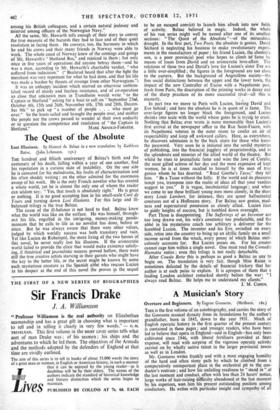The Quest of the Absolute
Lost Illusions. By Honore de Balzac in a new translation by Kathleen Raine. (John Lehmann. 2 Es.) THE hundred and fiftieth anniversary of Balzac's birth and the centenary of his death, falling within a year of one another, find his reputation in a curious state of instability. On the one side he is censured for his melodrama, his faults of characterisation and his often shoddy writing ; on the Other admired for the enormous sweep of his work. He is the only French novelist who has created a whole world, yet he is almost the only one of whom the reader can seldom -say: " Yes, that touch is absolutely right." He is great or nothing. It is no good accepting him in his small-scale Cure de Tours and turning down Lost Illusions. For this large and ill- balanced trilogy is the true Balzac.
The cause of the ill-balance is not hard to find. Balzac knew what the world was like on the surface. He was himself, through- out his life, engulfed in the intriguing, money-making pande- monium that he calls to life as no novelist has done, before or since. But he was always aware that there were other values, judged by which worldly success was both transitory and vain. Yet like Lucien de Rubempre, the more living of the two heroes of this novel, he never really lost his illusions. If the aristocratic world failed to provide the elixir that would make existence satisfy- ing, if theatrical and journalistic success proved hollow, there were still the true creative artists starving in their garrets who might have the key to the better life, or the secret might be known by some suck mysterious creature as the Spanish abbe who rescues Lucien in his despair at the end of this novel (he proves ill the sequel
to be an escaped convict) to launch him afresh into new fields of activity. Balzac believed in magic. Indeed, the whole of his vast series might well be named after one of its smallest sections: " The Quest of the Absolute "—of the miraculous draught. In the first part, Two Poets, the absolute is genius. David Sechard is neglecting his business to make revolutionary experi- ments in the manufacture of paper ; his friend Lucien, the chemist's son, is a poor provincial poet who hopes to climb to Tame by means of loans from David and an aristocratic love-affair. The relations of these two and David's love for Lucien's sister Eve are a little over-simplified ; the figures in the foreground are too close to the camera. But the background of Angouleme society—the fine social distinctions between the upper and the lower town, the impact of the new Controller of Excise with a Napoleonic past, fresh from Paris, the description of the printing works in decay and of the sharp practices of its more successful rival—all this is masterly.
In part two we move to Paris with Lucien, leaving David and Eve behind ; and here the absolute he is in quest of is fame. The over-large figures no longer block the foreground, aptd Lucien shrinks into scale with the world whose gates he is trying to crash. Nothing that Balzac ever wrote is more memorable than Lucien's first arrival at the newspaper office in the Rue Saint-Fiacre, with its Napoleonic veteran in the outer room to confer an air of respectability and keep off awkward callers. Here, as everywhere, he discovers admission is by the back stairs for those who know the password. Very soon he is initiated- into the sordid mysteries of publishing, into the financial jugglery of proprietorship, and to the splendours and miseries of the allied world of the theatre. But whilst he rises to journalistic fame and wins the love of Coralie, the most gifted actress of -her day and the most expensive of kept women, he is at times recalled to himself by the men of true genius whom he has deserted. " Read Goethe's Tasso," they tell him. " Be a Tasso without the folly. If the world and its pleasures tempt you, transpose into the realm of ideas all that your vanities suggest to you." It is vague, insubstantial language ; and when we come to see these brilliant young men more closely, in the short story Louis Lambert, for instance, they are queer hallucinated creatures out of a Hoffmann story. For Balzac saw genius, mad- ness and supernatural possession as closely allied. Lucien—rises to giddy heights of success, but is tumbled down overnight.
Part Three is disappointing. The Sufferings of an Inventor are too long drawn out, his wife's constancy too predictable, and the abbe in his mysterious coach too arbitrary a deliverer for the humbled Lucien. The inventor and his Eve, swindled on every side, retire into the country to bring up an idyllic family on a small income saved from the wreck, every penny of which Balzac meti- culously accounts for. But Lucien passes on. For his creator cannot cage him within a single novel. One must read the Comedie Humaine entire; even this trilogy is not really detachable.
After Cousin Bette this is perhaps as good a Balzac as any to begin on. The translation is very fair, though Miss Raine is sometimes defeated by the details of financial trickery that her author is at such pains to explain. It is apropos of them that a leading London architect remarked shortly before the war: " I always read Balzac. He helps me to understand my clients."
J. M. COHEN.


































 Previous page
Previous page